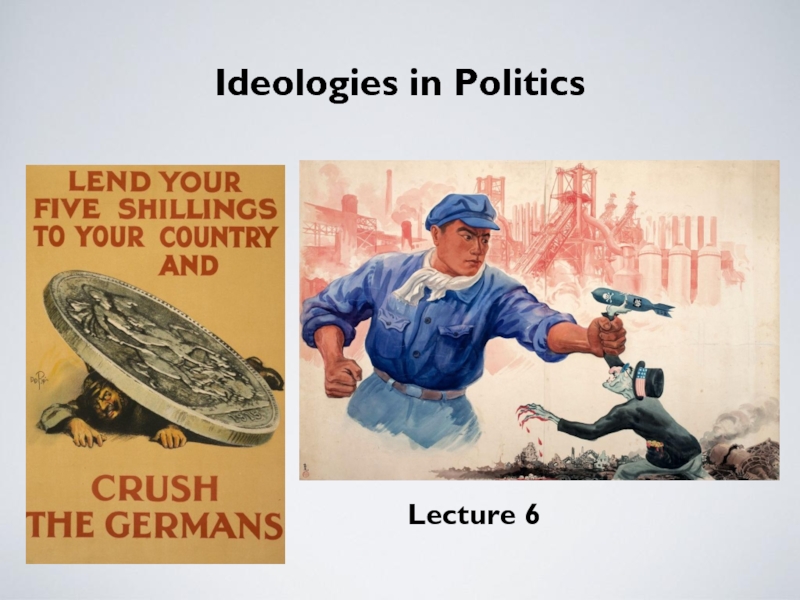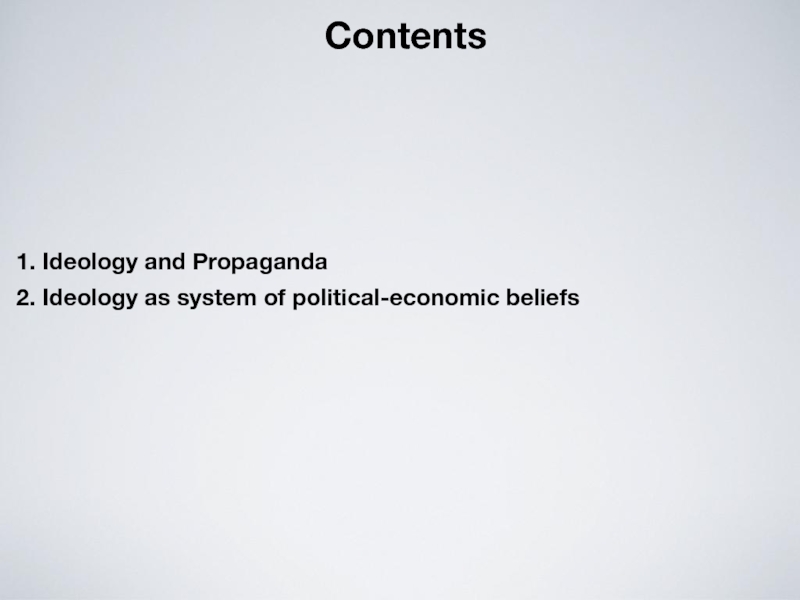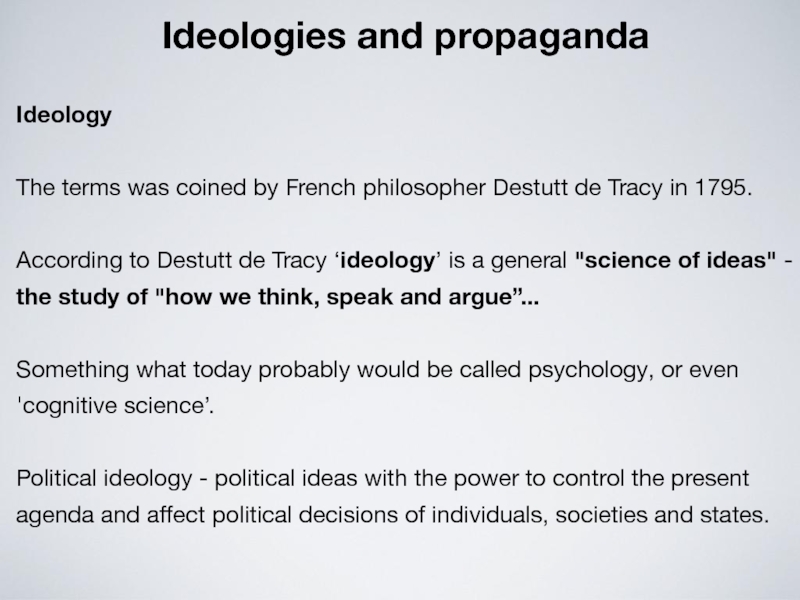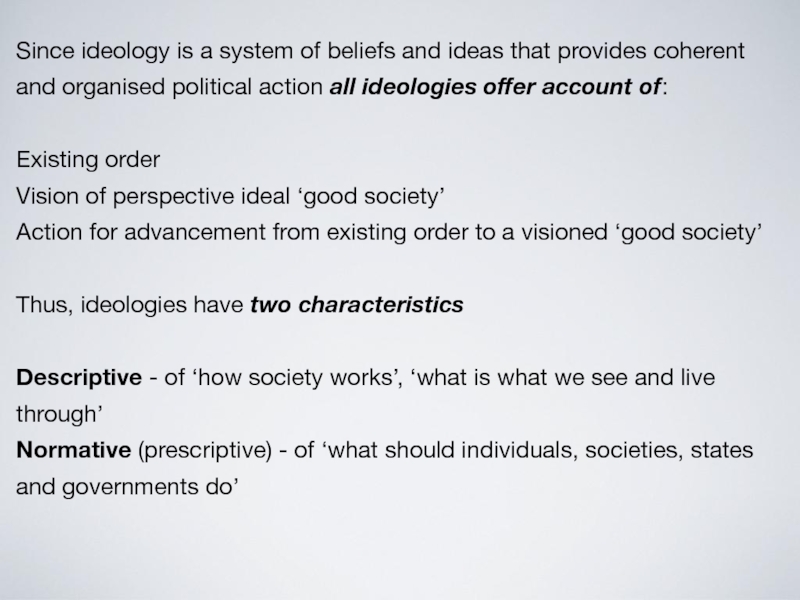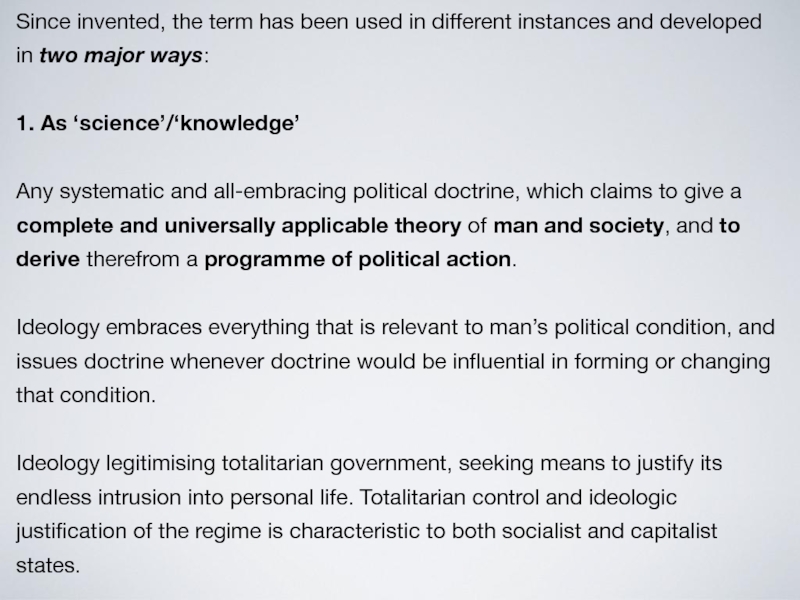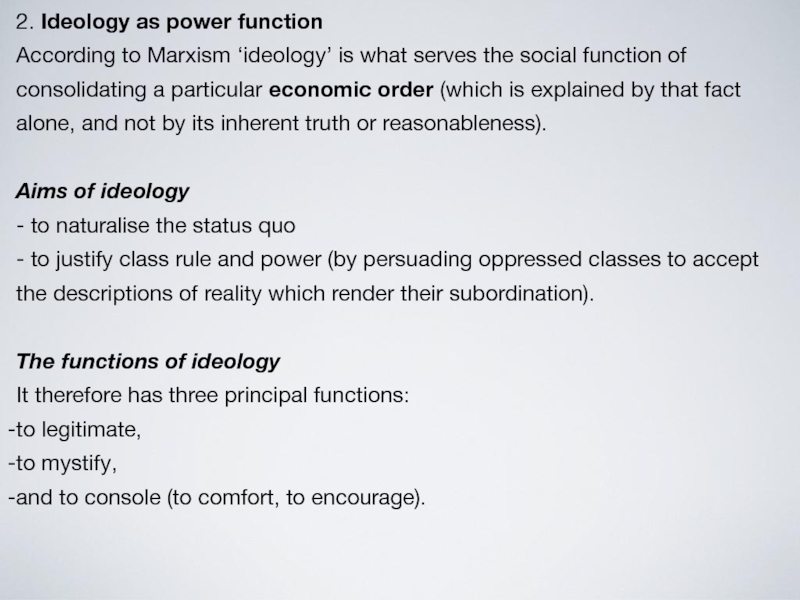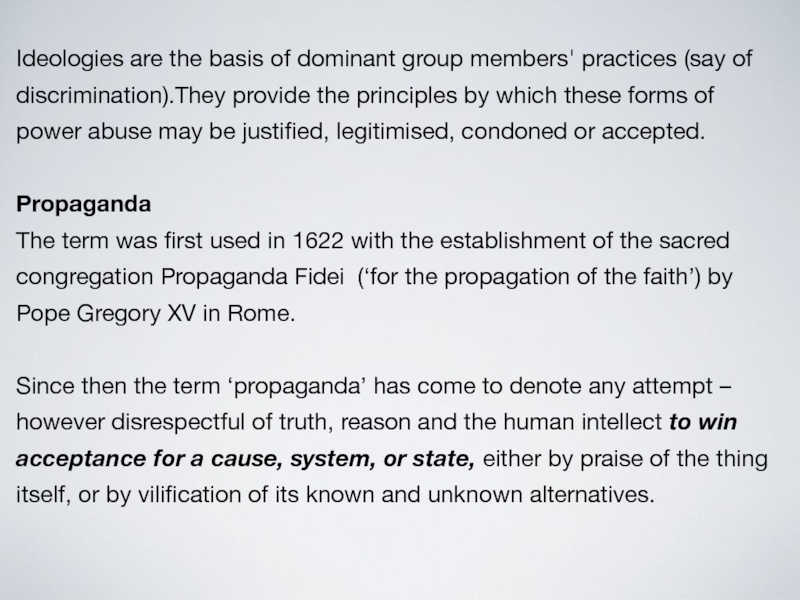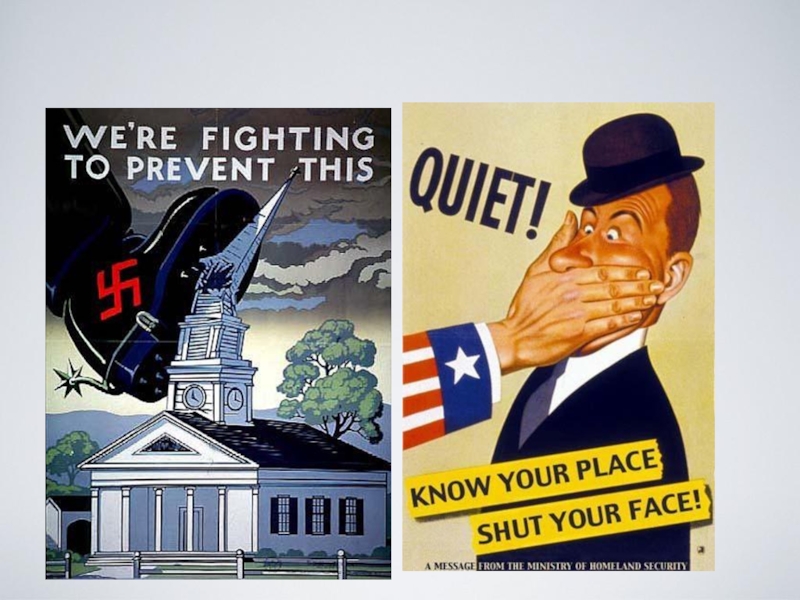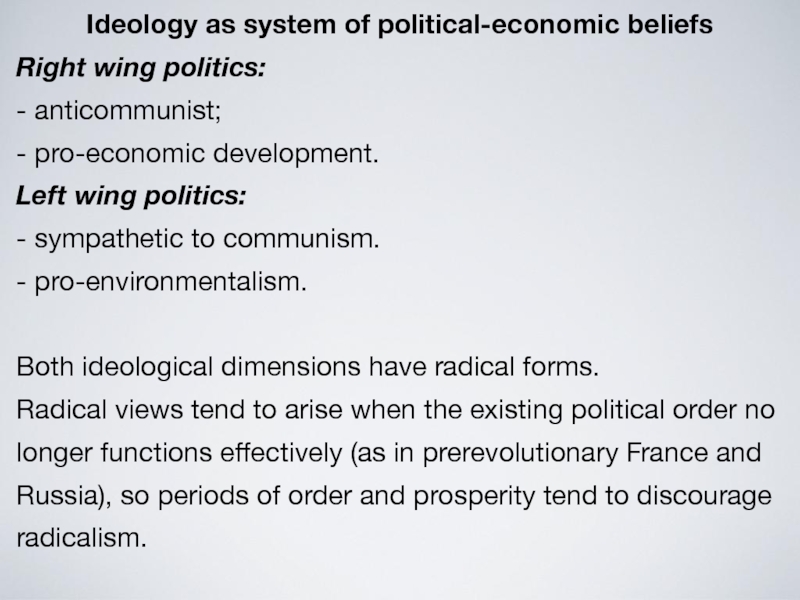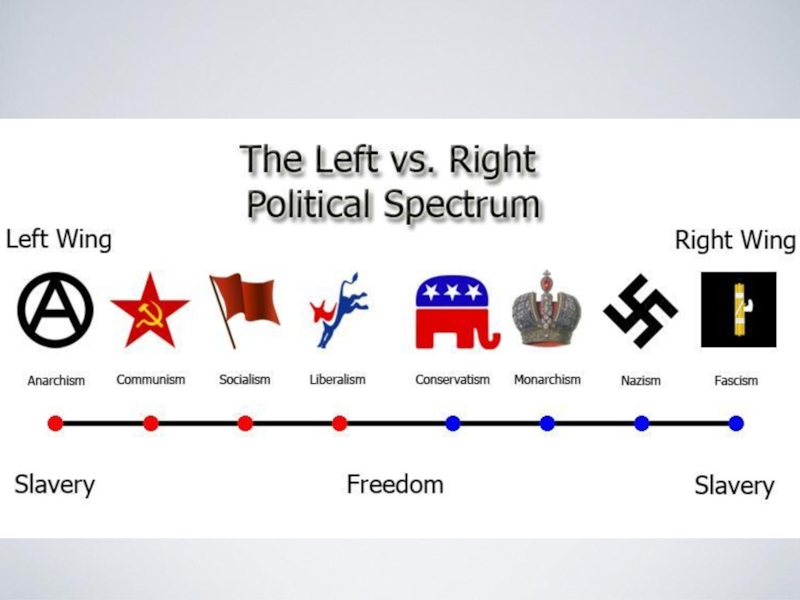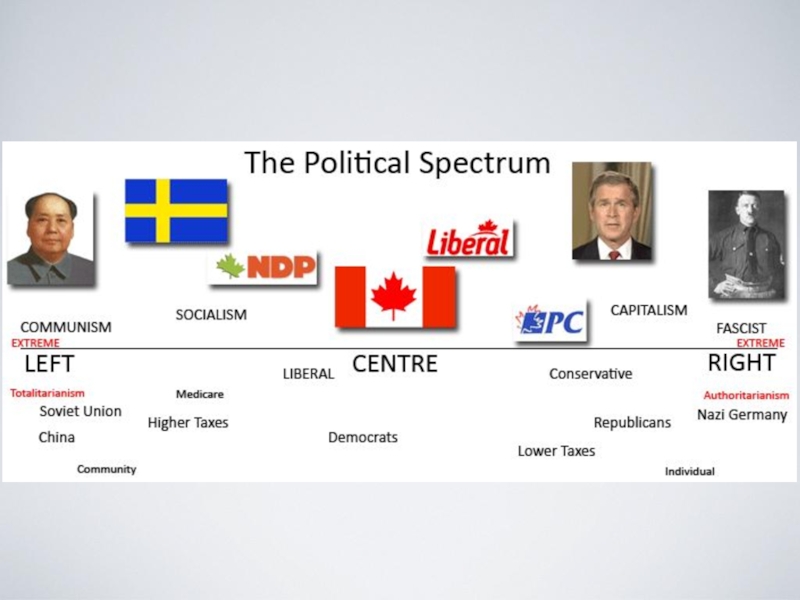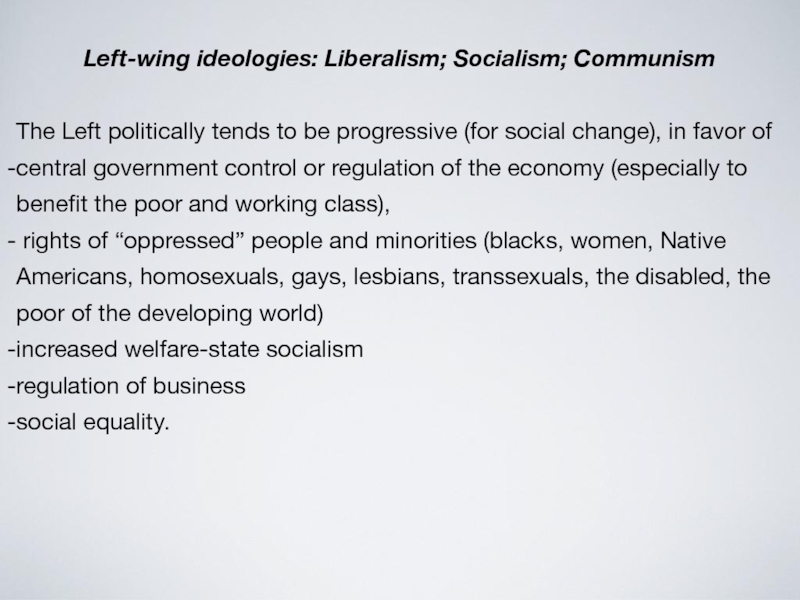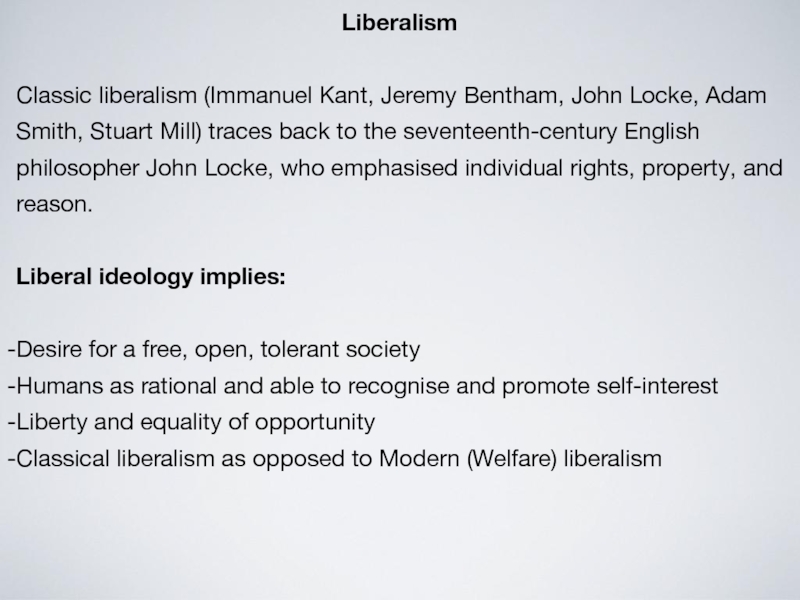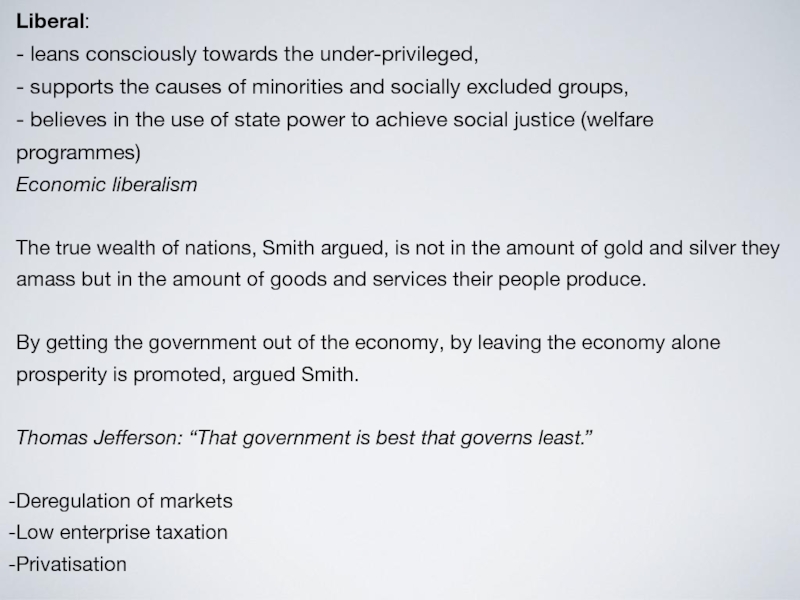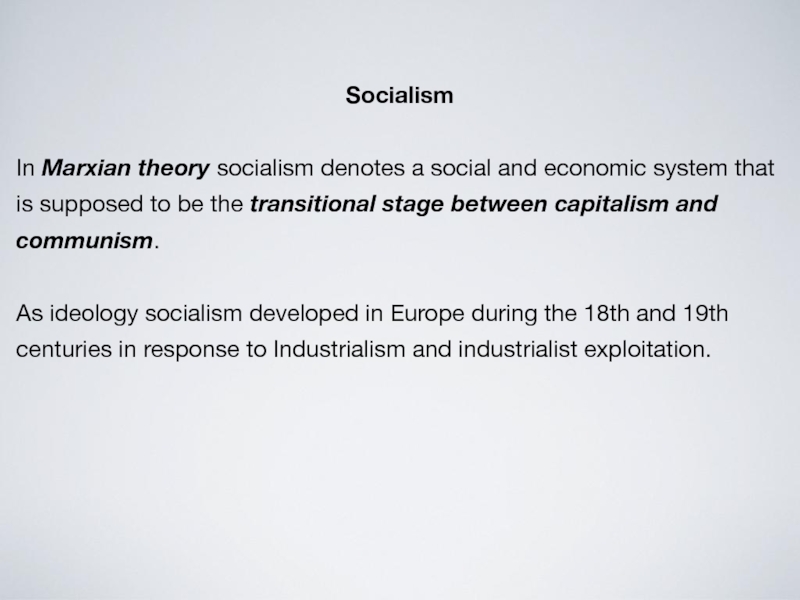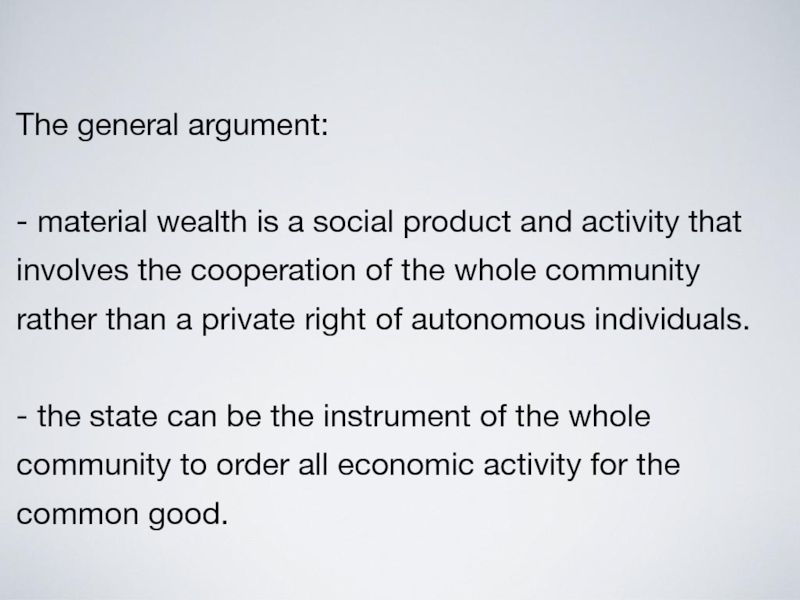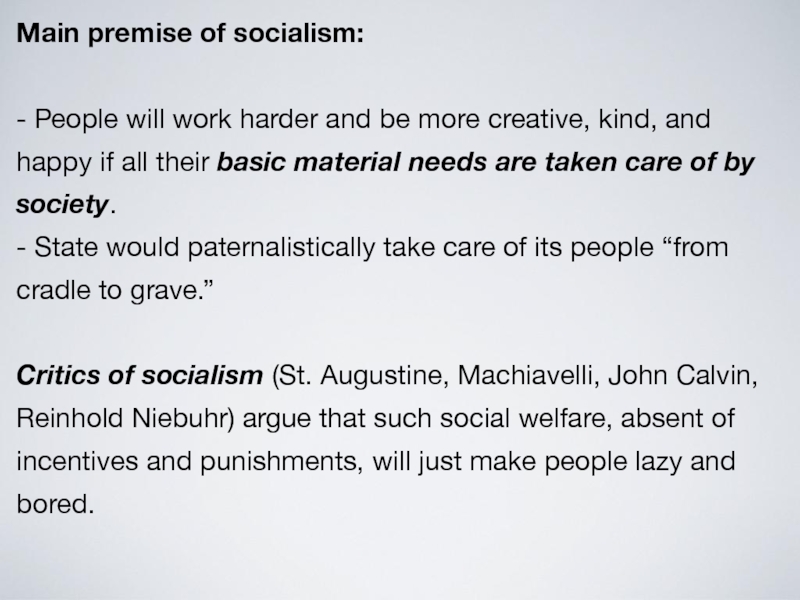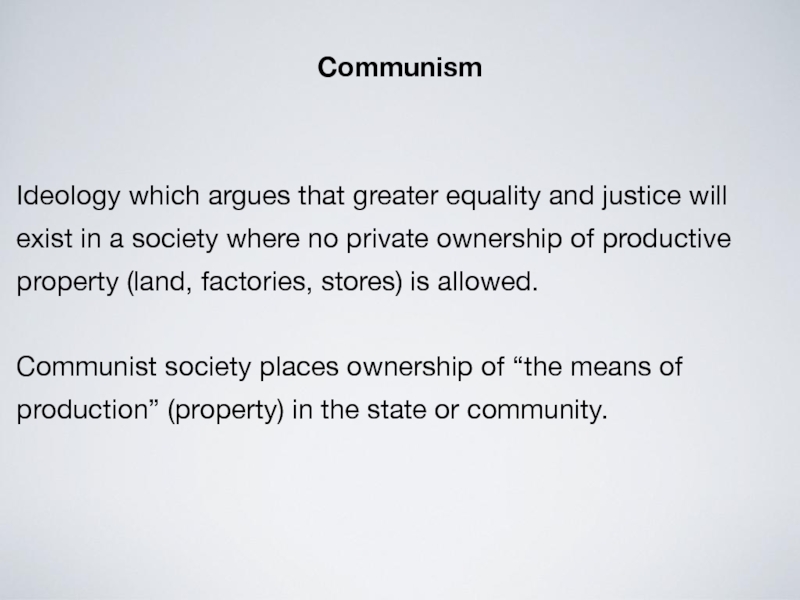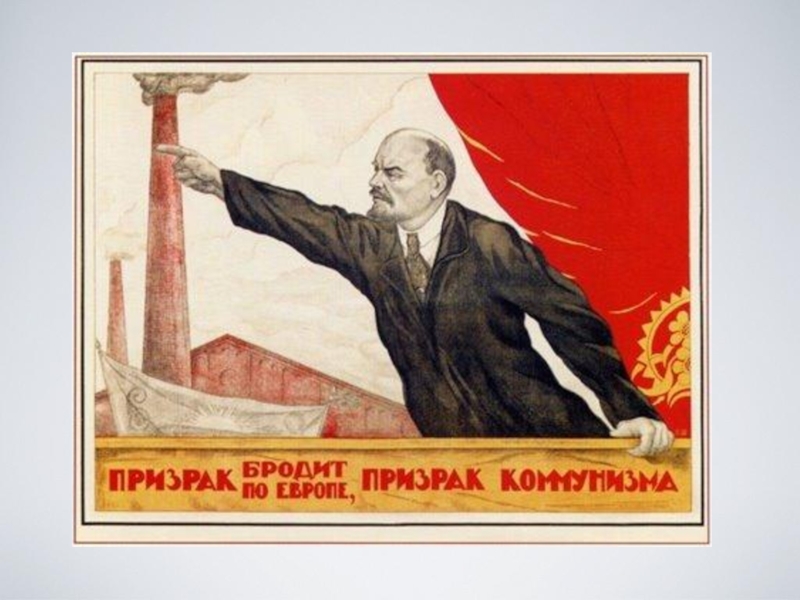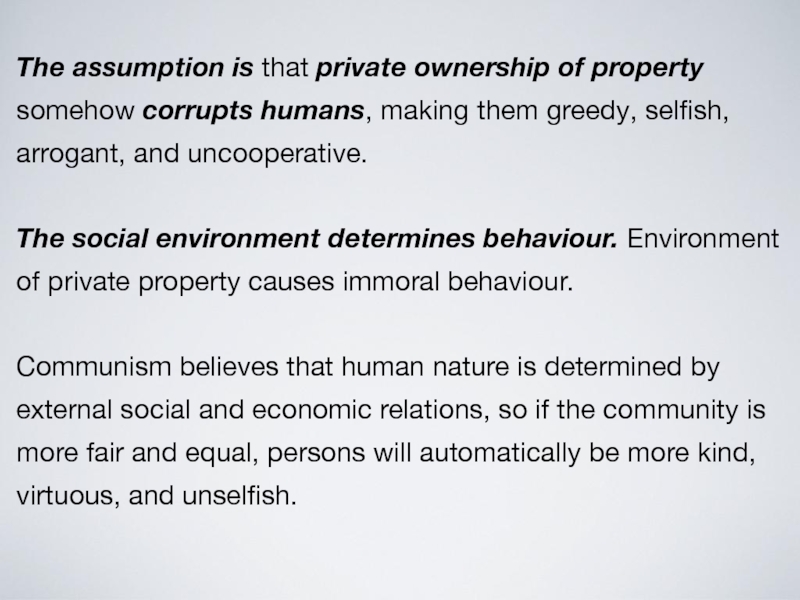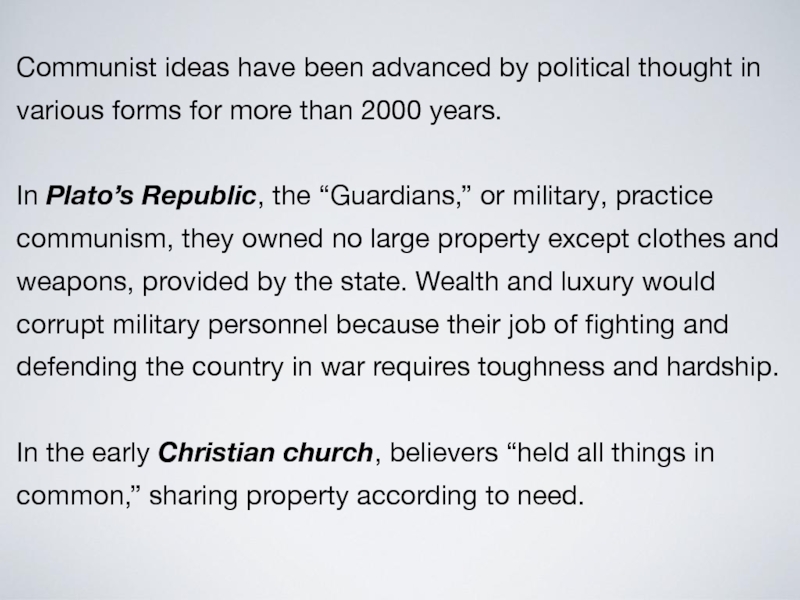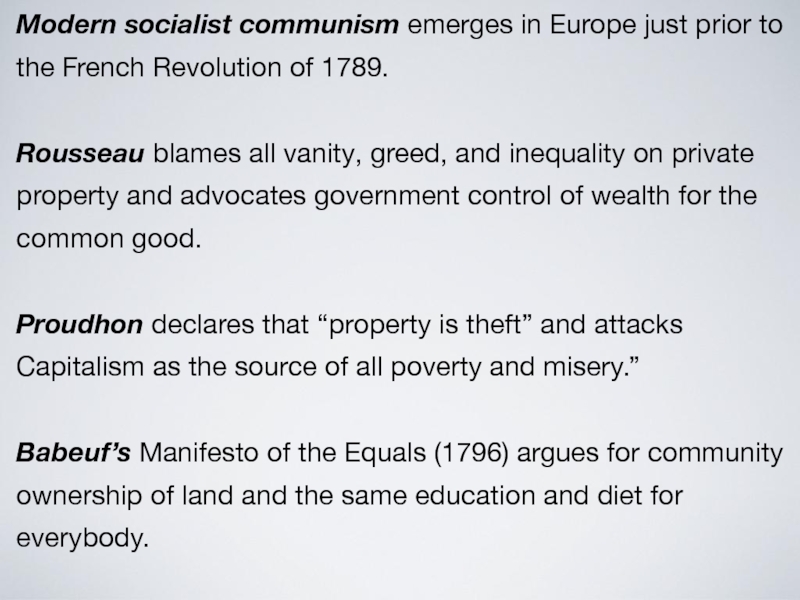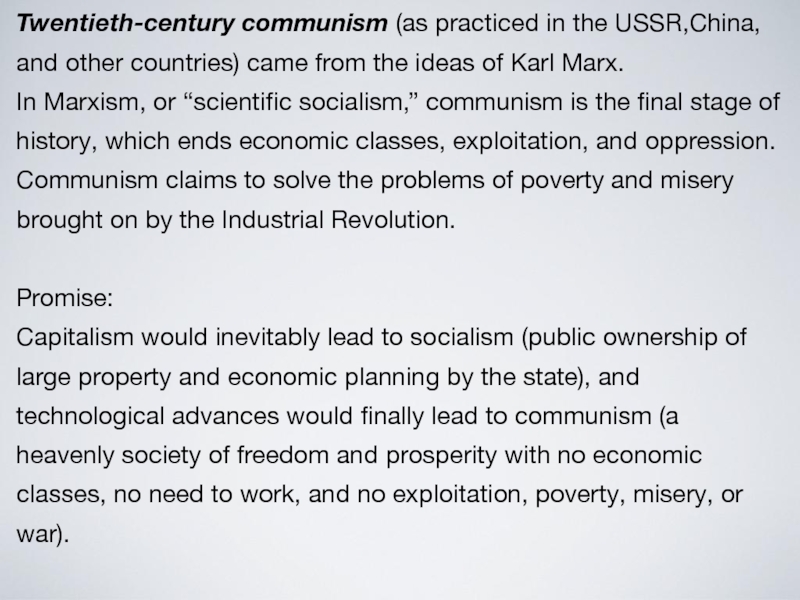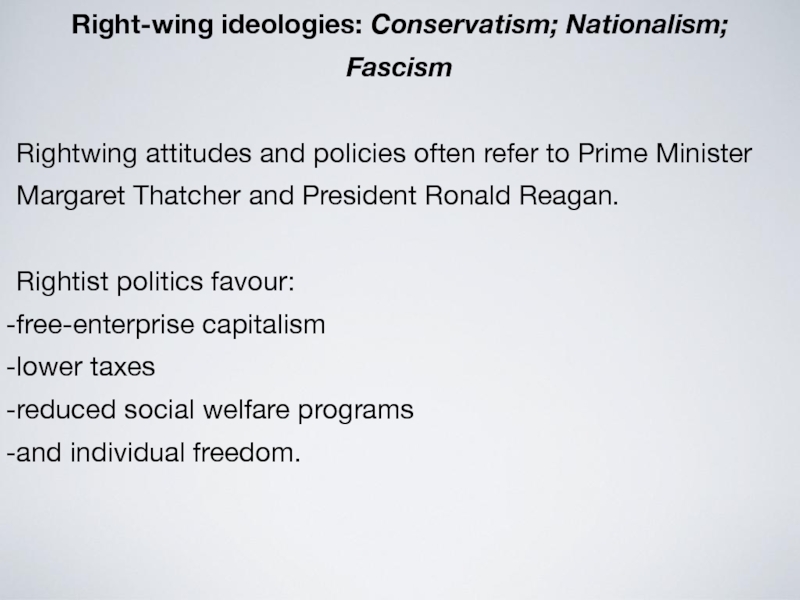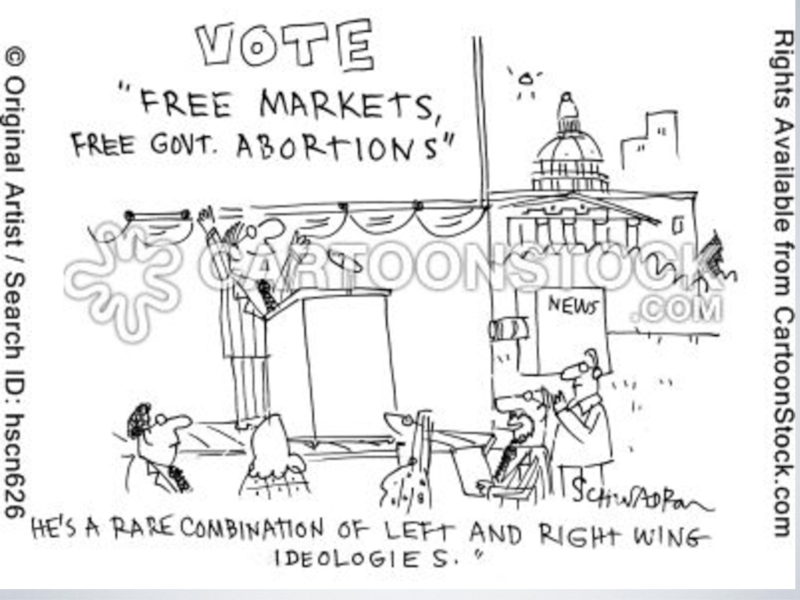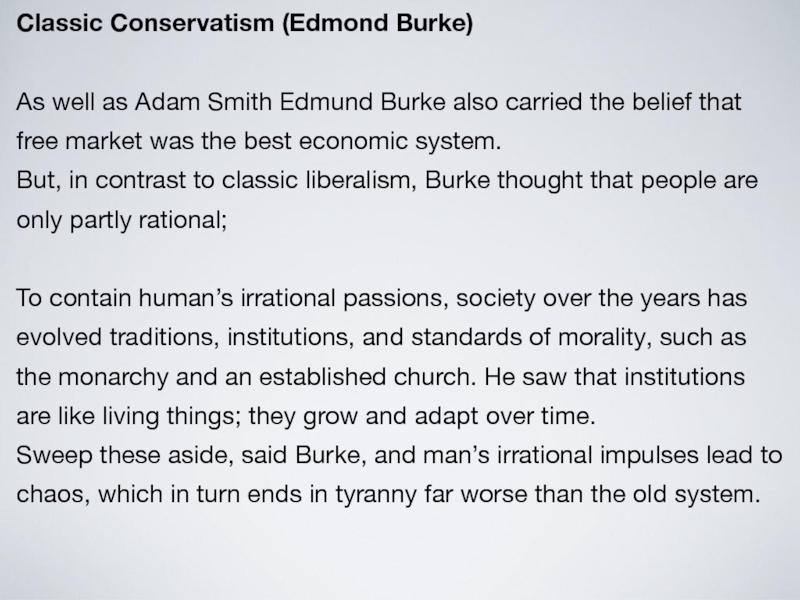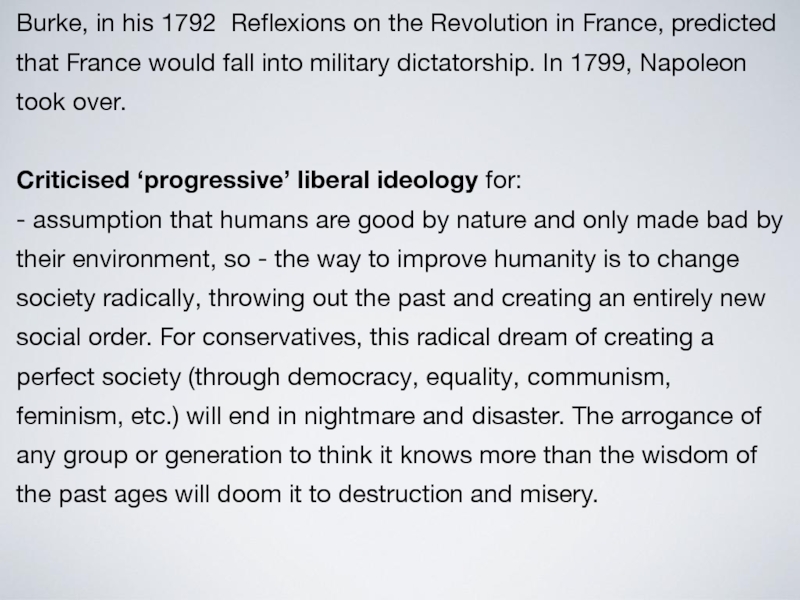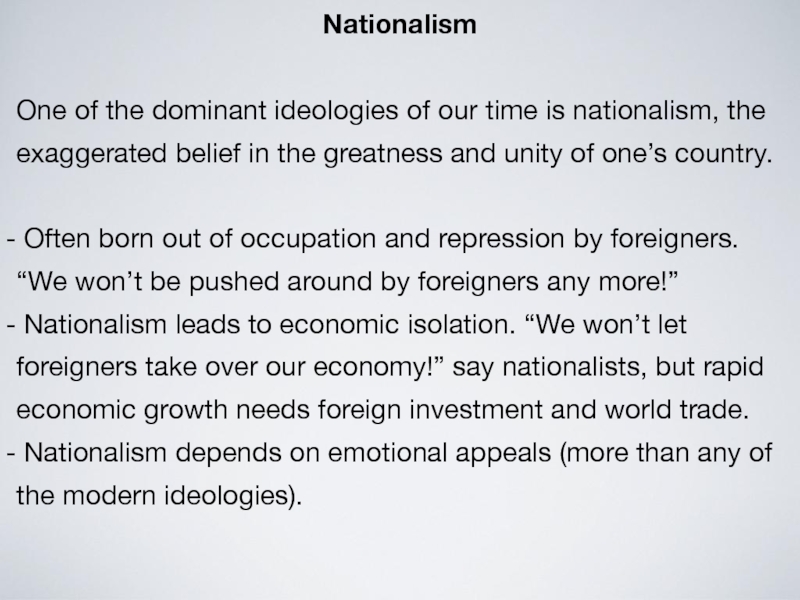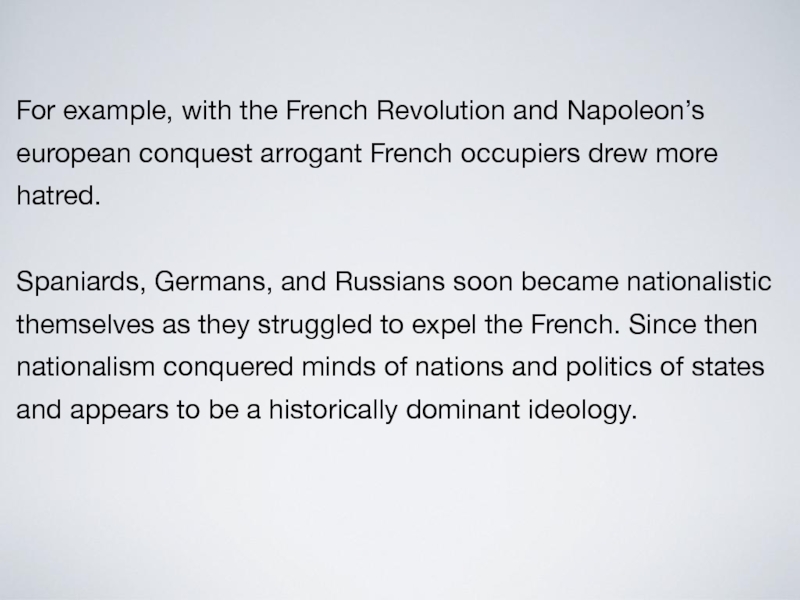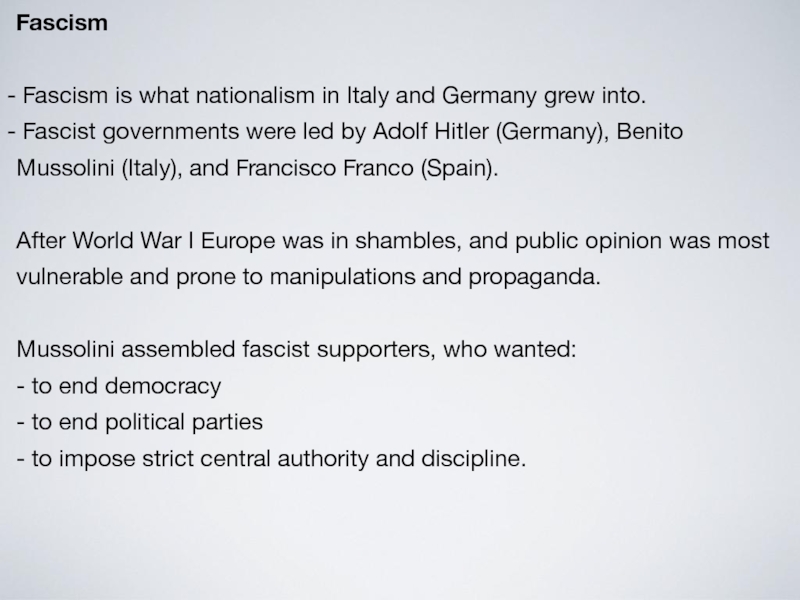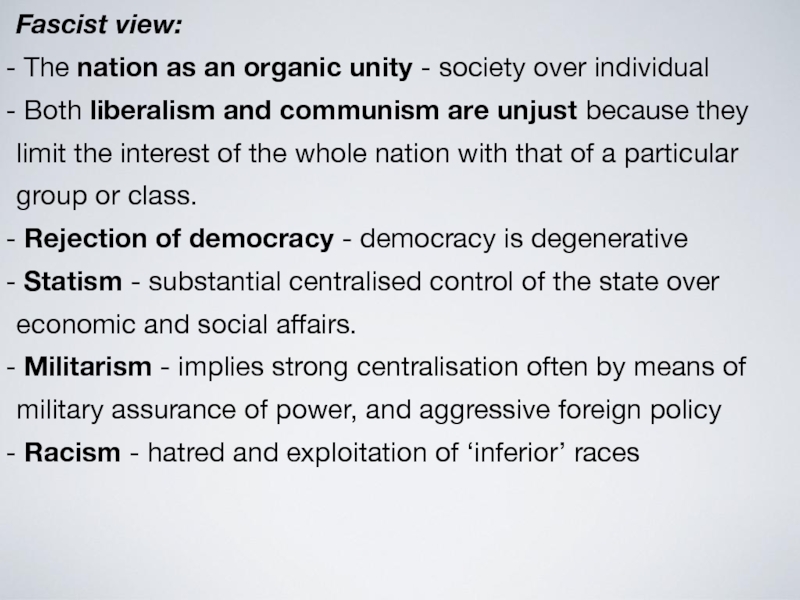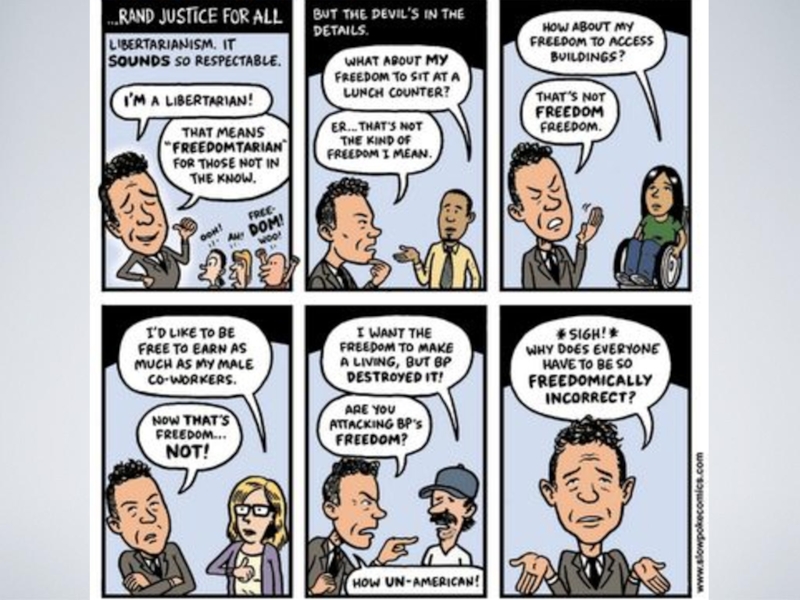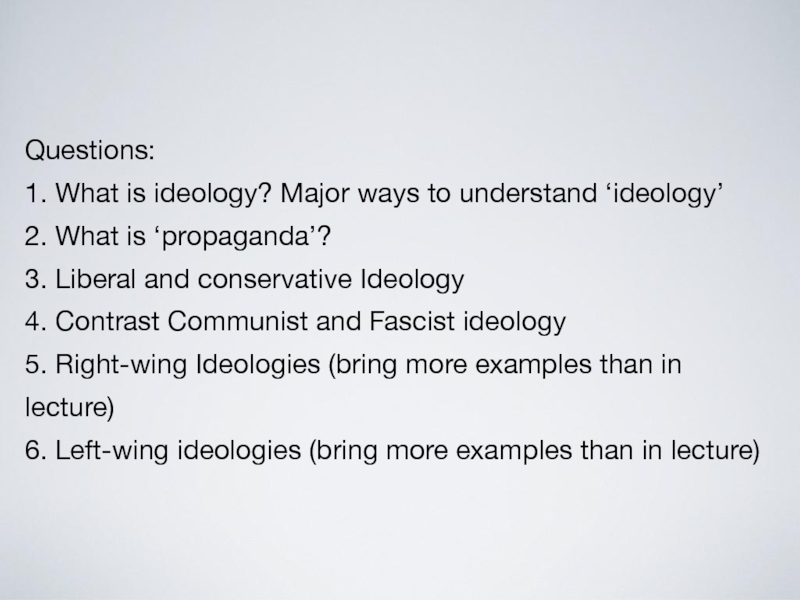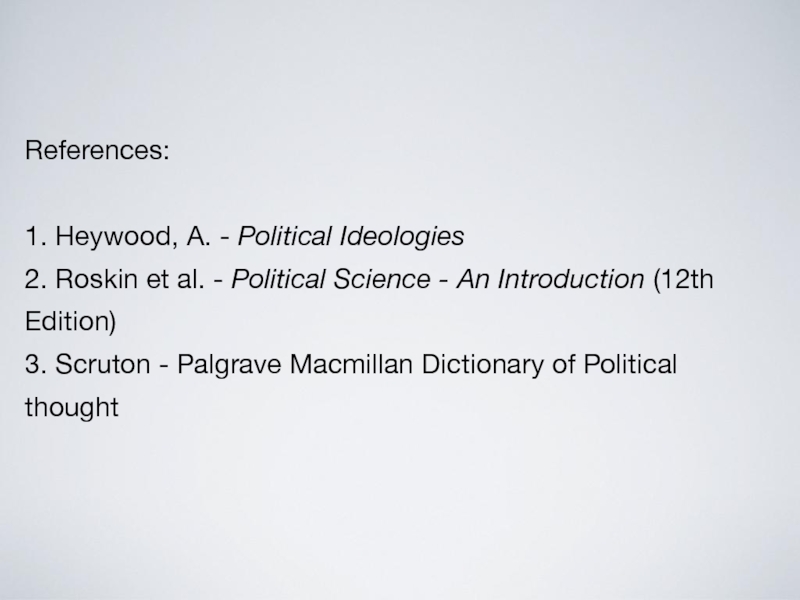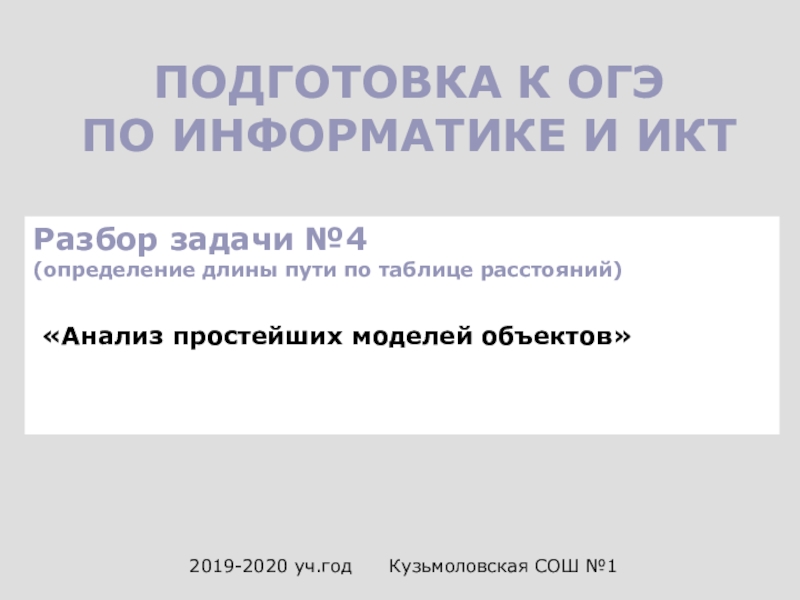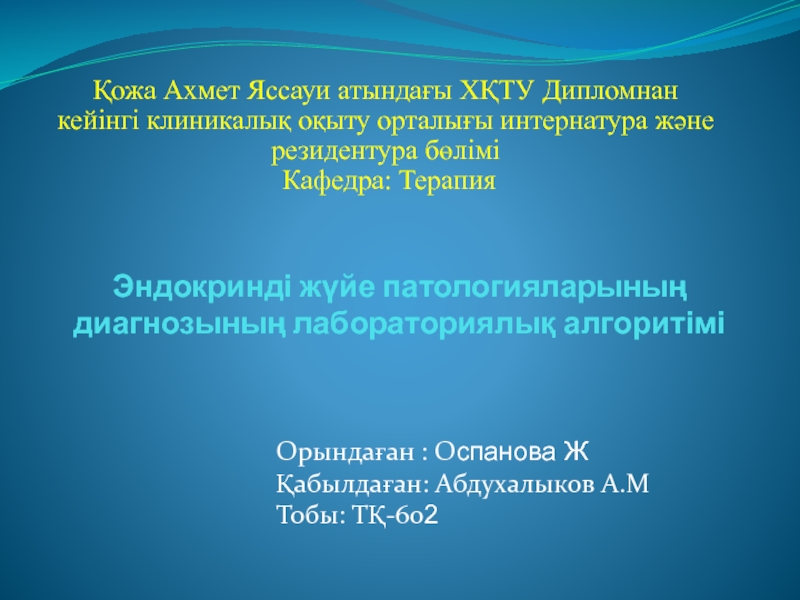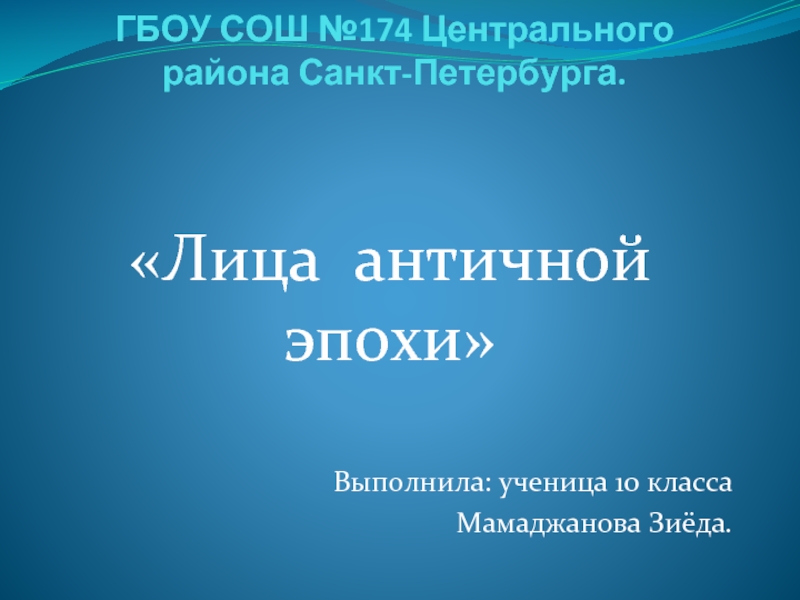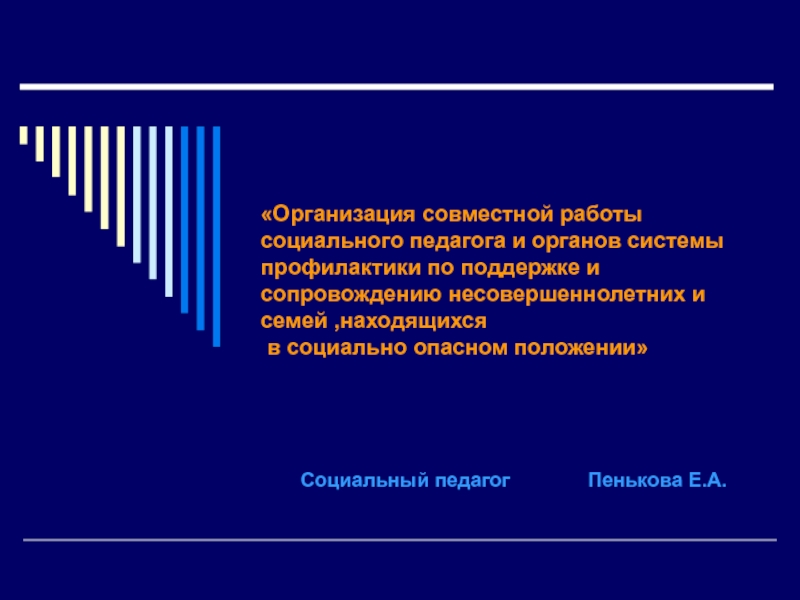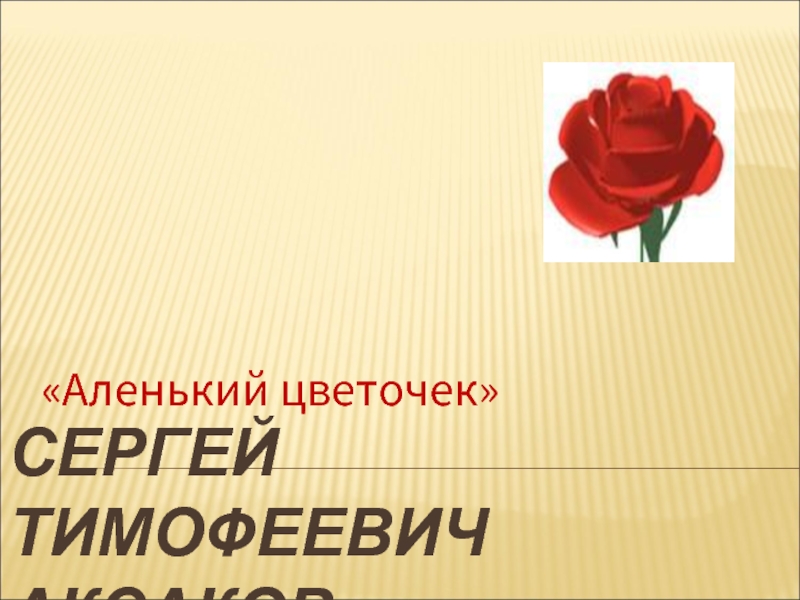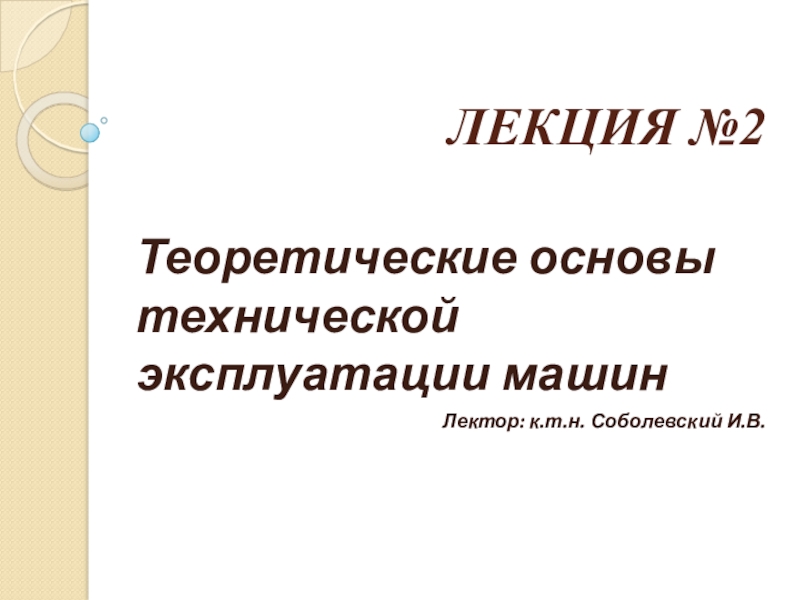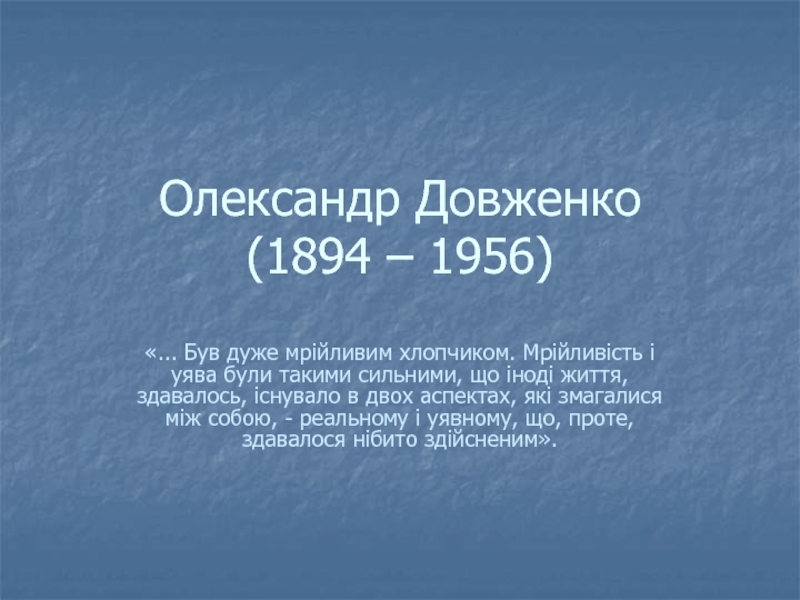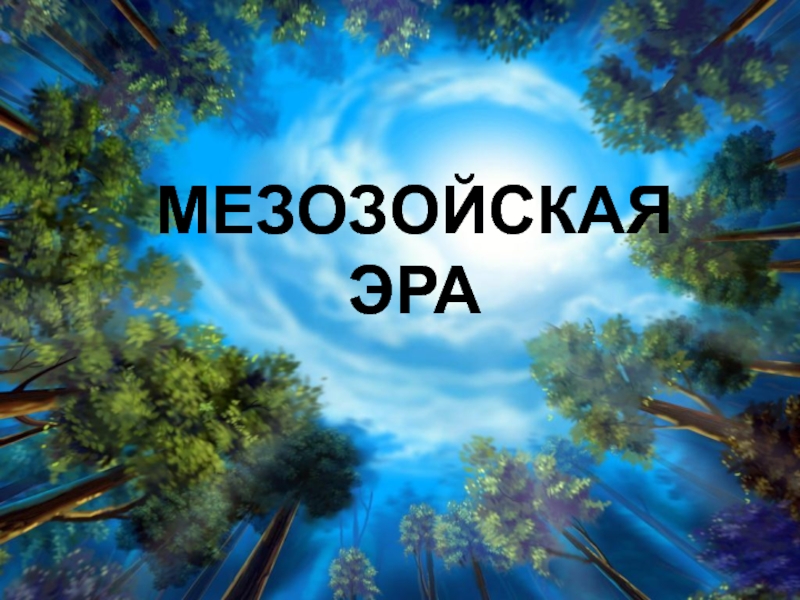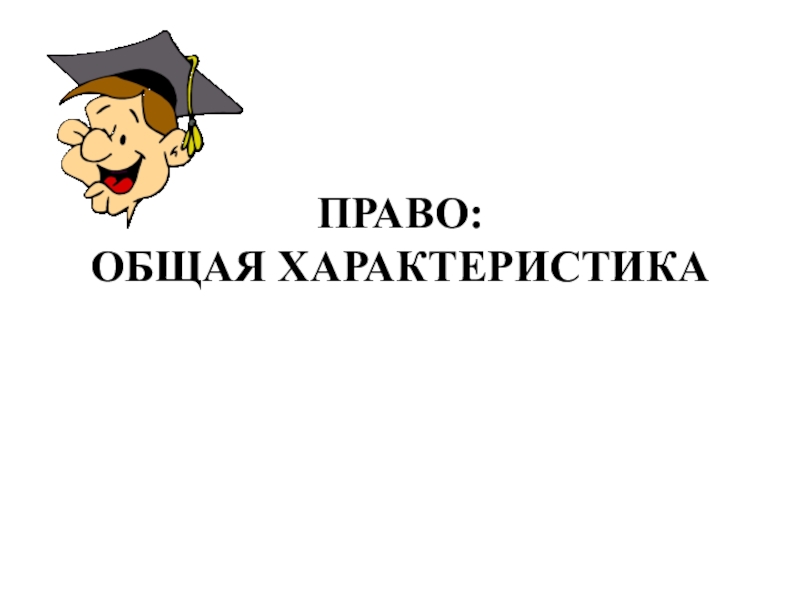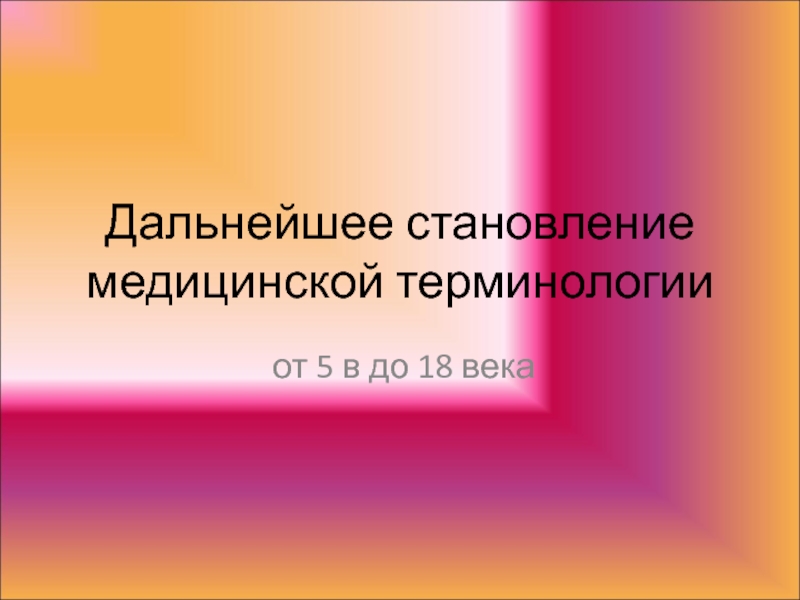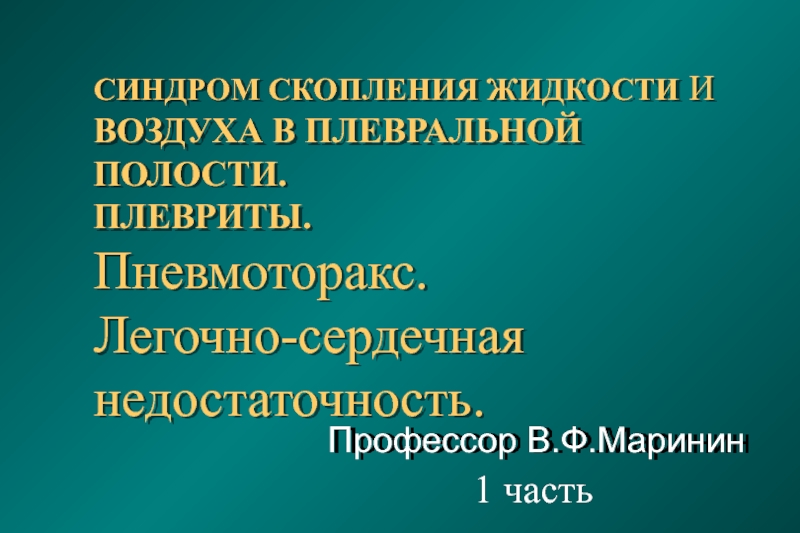Слайд 1Ideologies in Politics
Lecture 6
Слайд 2Contents
1. Ideology and Propaganda
2. Ideology as system of political-economic beliefs
Слайд 3Ideologies and propaganda
Ideology
The terms was coined by French philosopher Destutt
de Tracy in 1795.
According to Destutt de Tracy ‘ideology’ is
a general "science of ideas" - the study of "how we think, speak and argue”...
Something what today probably would be called psychology, or even 'cognitive science’.
Political ideology - political ideas with the power to control the present agenda and affect political decisions of individuals, societies and states.
Слайд 4Since ideology is a system of beliefs and ideas that
provides coherent and organised political action all ideologies offer account
of:
Existing order
Vision of perspective ideal ‘good society’
Action for advancement from existing order to a visioned ‘good society’
Thus, ideologies have two characteristics
Descriptive - of ‘how society works’, ‘what is what we see and live through’
Normative (prescriptive) - of ‘what should individuals, societies, states and governments do’
Слайд 5Since invented, the term has been used in different instances
and developed in two major ways:
1. As ‘science’/‘knowledge’
Any systematic and
all-embracing political doctrine, which claims to give a complete and universally applicable theory of man and society, and to derive therefrom a programme of political action.
Ideology embraces everything that is relevant to man’s political condition, and issues doctrine whenever doctrine would be influential in forming or changing that condition.
Ideology legitimising totalitarian government, seeking means to justify its endless intrusion into personal life. Totalitarian control and ideologic justification of the regime is characteristic to both socialist and capitalist states.
Слайд 62. Ideology as power function
According to Marxism ‘ideology’ is
what serves the social function of consolidating a particular economic
order (which is explained by that fact alone, and not by its inherent truth or reasonableness).
Aims of ideology
- to naturalise the status quo
- to justify class rule and power (by persuading oppressed classes to accept the descriptions of reality which render their subordination).
The functions of ideology
It therefore has three principal functions:
to legitimate,
to mystify,
and to console (to comfort, to encourage).
Слайд 7
Ideologies are the basis of dominant group members' practices (say
of discrimination).They provide the principles by which these forms of
power abuse may be justified, legitimised, condoned or accepted.
Propaganda
The term was first used in 1622 with the establishment of the sacred congregation Propaganda Fidei (‘for the propagation of the faith’) by Pope Gregory XV in Rome.
Since then the term ‘propaganda’ has come to denote any attempt – however disrespectful of truth, reason and the human intellect to win acceptance for a cause, system, or state, either by praise of the thing itself, or by vilification of its known and unknown alternatives.
Слайд 9Ideology as system of political-economic beliefs
Right wing politics:
- anticommunist;
- pro-economic
development.
Left wing politics:
- sympathetic to communism.
- pro-environmentalism.
Both ideological dimensions
have radical forms.
Radical views tend to arise when the existing political order no longer functions effectively (as in prerevolutionary France and Russia), so periods of order and prosperity tend to discourage radicalism.
Слайд 12
Left-wing ideologies: Liberalism; Socialism; Communism
The Left politically tends to be
progressive (for social change), in favor of
central government control
or regulation of the economy (especially to benefit the poor and working class),
rights of “oppressed” people and minorities (blacks, women, Native Americans, homosexuals, gays, lesbians, transsexuals, the disabled, the poor of the developing world)
increased welfare-state socialism
regulation of business
social equality.
Слайд 13Liberalism
Classic liberalism (Immanuel Kant, Jeremy Bentham, John Locke, Adam Smith,
Stuart Mill) traces back to the seventeenth-century English philosopher John
Locke, who emphasised individual rights, property, and reason.
Liberal ideology implies:
Desire for a free, open, tolerant society
Humans as rational and able to recognise and promote self-interest
Liberty and equality of opportunity
Classical liberalism as opposed to Modern (Welfare) liberalism
Слайд 14Liberal:
- leans consciously towards the under-privileged,
- supports the causes
of minorities and socially excluded groups,
- believes in the
use of state power to achieve social justice (welfare programmes)
Economic liberalism
The true wealth of nations, Smith argued, is not in the amount of gold and silver they amass but in the amount of goods and services their people produce.
By getting the government out of the economy, by leaving the economy alone prosperity is promoted, argued Smith.
Thomas Jefferson: “That government is best that governs least.”
Deregulation of markets
Low enterprise taxation
Privatisation
Слайд 15
Socialism
In Marxian theory socialism denotes a social and economic system
that is supposed to be the transitional stage between capitalism
and communism.
As ideology socialism developed in Europe during the 18th and 19th centuries in response to Industrialism and industrialist exploitation.
Слайд 16
The general argument:
- material wealth is a social product and
activity that involves the cooperation of the whole community rather
than a private right of autonomous individuals.
- the state can be the instrument of the whole community to order all economic activity for the common good.
Слайд 17Main premise of socialism:
- People will work harder and be
more creative, kind, and happy if all their basic material
needs are taken care of by society.
- State would paternalistically take care of its people “from cradle to grave.”
Critics of socialism (St. Augustine, Machiavelli, John Calvin, Reinhold Niebuhr) argue that such social welfare, absent of incentives and punishments, will just make people lazy and bored.
Слайд 18
Communism
Ideology which argues that greater equality and justice will exist
in a society where no private ownership of productive property
(land, factories, stores) is allowed.
Communist society places ownership of “the means of production” (property) in the state or community.
Слайд 20
The assumption is that private ownership of property somehow corrupts
humans, making them greedy, selfish, arrogant, and uncooperative.
The social environment
determines behaviour. Environment of private property causes immoral behaviour.
Communism believes that human nature is determined by external social and economic relations, so if the community is more fair and equal, persons will automatically be more kind, virtuous, and unselfish.
Слайд 21
Communist ideas have been advanced by political thought in various
forms for more than 2000 years.
In Plato’s Republic, the
“Guardians,” or military, practice communism, they owned no large property except clothes and weapons, provided by the state. Wealth and luxury would corrupt military personnel because their job of fighting and defending the country in war requires toughness and hardship.
In the early Christian church, believers “held all things in common,” sharing property according to need.
Слайд 22Modern socialist communism emerges in Europe just prior to the
French Revolution of 1789.
Rousseau blames all vanity, greed, and
inequality on private property and advocates government control of wealth for the common good.
Proudhon declares that “property is theft” and attacks Capitalism as the source of all poverty and misery.”
Babeuf’s Manifesto of the Equals (1796) argues for community ownership of land and the same education and diet for everybody.
Слайд 23Twentieth-century communism (as practiced in the USSR,China, and other countries)
came from the ideas of Karl Marx.
In Marxism, or
“scientific socialism,” communism is the final stage of history, which ends economic classes, exploitation, and oppression.
Communism claims to solve the problems of poverty and misery brought on by the Industrial Revolution.
Promise:
Capitalism would inevitably lead to socialism (public ownership of large property and economic planning by the state), and technological advances would finally lead to communism (a heavenly society of freedom and prosperity with no economic classes, no need to work, and no exploitation, poverty, misery, or war).
Слайд 24Right-wing ideologies: Conservatism; Nationalism; Fascism
Rightwing attitudes and policies often refer
to Prime Minister Margaret Thatcher and President Ronald Reagan.
Rightist
politics favour:
free-enterprise capitalism
lower taxes
reduced social welfare programs
and individual freedom.
Слайд 26Classic Conservatism (Edmond Burke)
As well as Adam Smith Edmund Burke
also carried the belief that free market was the best
economic system.
But, in contrast to classic liberalism, Burke thought that people are only partly rational;
To contain human’s irrational passions, society over the years has evolved traditions, institutions, and standards of morality, such as the monarchy and an established church. He saw that institutions are like living things; they grow and adapt over time.
Sweep these aside, said Burke, and man’s irrational impulses lead to chaos, which in turn ends in tyranny far worse than the old system.
Слайд 27Burke, in his 1792 Reflexions on the Revolution in France,
predicted that France would fall into military dictatorship. In 1799,
Napoleon took over.
Criticised ‘progressive’ liberal ideology for:
- assumption that humans are good by nature and only made bad by their environment, so - the way to improve humanity is to change society radically, throwing out the past and creating an entirely new social order. For conservatives, this radical dream of creating a perfect society (through democracy, equality, communism, feminism, etc.) will end in nightmare and disaster. The arrogance of any group or generation to think it knows more than the wisdom of the past ages will doom it to destruction and misery.
Слайд 28Nationalism
One of the dominant ideologies of our time is nationalism,
the exaggerated belief in the greatness and unity of one’s
country.
Often born out of occupation and repression by foreigners. “We won’t be pushed around by foreigners any more!”
Nationalism leads to economic isolation. “We won’t let foreigners take over our economy!” say nationalists, but rapid economic growth needs foreign investment and world trade.
Nationalism depends on emotional appeals (more than any of the modern ideologies).
Слайд 29
For example, with the French Revolution and Napoleon’s european conquest
arrogant French occupiers drew more hatred.
Spaniards, Germans, and Russians
soon became nationalistic themselves as they struggled to expel the French. Since then nationalism conquered minds of nations and politics of states and appears to be a historically dominant ideology.
Слайд 30Fascism
Fascism is what nationalism in Italy and Germany grew
into.
Fascist governments were led by Adolf Hitler (Germany),
Benito Mussolini (Italy), and Francisco Franco (Spain).
After World War I Europe was in shambles, and public opinion was most vulnerable and prone to manipulations and propaganda.
Mussolini assembled fascist supporters, who wanted:
- to end democracy
- to end political parties
- to impose strict central authority and discipline.
Слайд 31Fascist view:
The nation as an organic unity - society
over individual
Both liberalism and communism are unjust because they
limit the interest of the whole nation with that of a particular group or class.
Rejection of democracy - democracy is degenerative
Statism - substantial centralised control of the state over economic and social affairs.
Militarism - implies strong centralisation often by means of military assurance of power, and aggressive foreign policy
Racism - hatred and exploitation of ‘inferior’ races
Слайд 32In sum, as soon as people act as members of
social groups, they may bring to bear their ideologies in
their actions and interaction.
Human => enters Society => Human brings his ideology into the Society
Thus, men may discriminate against women, whites against blacks, the young against the aged, and the rich against the poor.
Слайд 34Questions:
1. What is ideology? Major ways to understand ‘ideology’
2. What
is ‘propaganda’?
3. Liberal and conservative Ideology
4. Contrast Communist and Fascist
ideology
5. Right-wing Ideologies (bring more examples than in lecture)
6. Left-wing ideologies (bring more examples than in lecture)
Слайд 35References:
1. Heywood, A. - Political Ideologies
2. Roskin et al. -
Political Science - An Introduction (12th Edition)
3. Scruton - Palgrave
Macmillan Dictionary of Political thought
